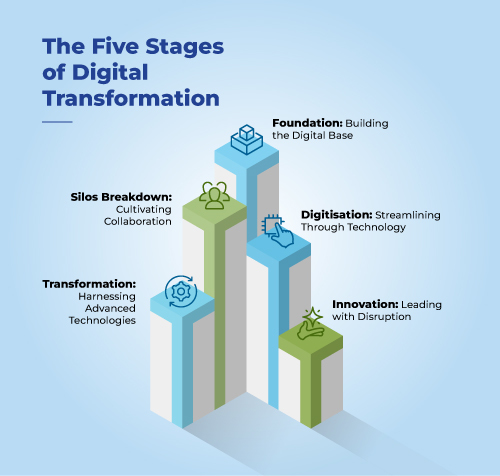In the fast-evolving landscape of today's business world, the term "digital transformation" has emerged as a guiding light for organisations striving to stay relevant and competitive. The digital era has brought an unprecedented shift in how businesses operate, connect with customers, and drive growth. In this blog, we will dive into the core aspects of digital transformation, focusing on its significance in digital marketing, its fundamental components, and its remarkable benefits.
What is Digital Transformation?


At its core, digital transformation signifies a holistic reimagining of an organisation's strategies, processes, and operations to leverage the power of digital technologies. It's not just about adopting new tools; it's a profound shift that impacts the entire fabric of a business, from its internal workflows to its external interactions with customers and partners. This transformation aims to create an agile, customer-centric, data-driven organisation thriving in the digital age.
Digital Transformation in Digital Marketing


Within digital marketing, the concept of digital transformation takes on a specific dimension. It involves leveraging digital technologies to enhance customer experience, streamline marketing operations, and drive growth. It's about meeting the evolving expectations of digitally savvy consumers and engaging with them across multiple touchpoints seamlessly. To sum up, digital transformation in digital marketing empowers businesses to craft personalised, relevant, and impactful interactions throughout the customer journey.
The Four Pillars of Digital Transformation


Digital transformation is not a one-size-fits-all process; it's a strategic endeavour that varies across industries and organisations. However, four main areas form the foundation of any digital transformation initiative:
-
Customer Experience Transformation:
Placing the customer at the centre, this pillar focuses on creating exceptional experiences across all touchpoints. It involves understanding customer needs, preferences, and behaviours to tailor interactions that resonate and foster loyalty.
-
Operational Process Transformation:
This aspect involves reimagining internal processes and workflows using digital technologies. Automation, data analytics, and cloud computing are pivotal in optimising operations and increasing efficiency.
-
Business Model Transformation:
Here, organisations explore new revenue streams and business models enabled by digital technologies. It's about identifying innovative ways to deliver customer value and stay ahead of market disruptions.
-
Cultural Transformation:
A successful digital transformation requires a cultural shift. It fosters a culture of innovation, adaptability, and continuous learning where employees embrace and drive change.
Digital Marketing's Role in Digital Transformations


Digital growth marketing is an integral part of the broader digital transformation journey. As businesses transform, digital marketing is critical in amplifying the impact. It leverages digital channels, data analytics, and automation to create targeted campaigns, enhance customer engagement, and drive measurable results.
The Five Stages of Digital Transformation
Digital transformation is not a destination; it's a continuous journey marked by distinct stages of evolution. These stages, as outlined by leading experts, can be summarised as follows:
-
Foundation: Building the Digital Base
In the initial stage, organisations lay the foundation for digital transformation. They establish the necessary infrastructure, adopt fundamental digital tools, and enhance data management practices. This phase sets the groundwork for subsequent advancements by ensuring a robust digital framework.
-
Silos Breakdown: Cultivating Collaboration
As transformation progresses, organisational silos dissolve, promoting collaboration and data sharing across departments. This integrated approach enhances decision-making and problem-solving capabilities, fostering a culture of unity and communication within the organisation.
-
Digitisation: Streamlining Through Technology
Digitisation replaces manual processes with digital alternatives, boosting efficiency and accessibility. Tasks are streamlined through digital tools and platforms, leading to increased accuracy, reduced costs, and improved agility in adapting to market changes.
-
Transformation: Harnessing Advanced Technologies
Embracing advanced technologies such as AI, machine learning, and IoT defines the transformation stage. These tools reshape processes, facilitate data-driven decision-making, and enhance customer experiences. The organisation shifts towards a more innovative and technology-driven approach.
-
Innovation: Leading with Disruption
The pinnacle is reached with innovation, where organisations not only adapt to technology but lead its evolution. By exploring emerging technologies like blockchain and augmented reality, businesses create new business models and redefine industry standards, reshaping markets in the process.
The Benefits of Digital Transformation
The benefits of embracing digital transformation are extensive and far-reaching. They include improved operational efficiency, enhanced customer experiences, faster decision-making through data-driven insights, increased agility in responding to market changes, and a competitive edge that positions businesses for sustainable growth.
Empowering Growth Through Digital Transformation
Among the industry leaders in digital marketing stands Amura Marketing Technologies. As a leading growth marketing agency, Amura specialises in crafting and executing result-oriented marketing strategies. Our services, including social media marketing, email marketing, pay-per-click advertising, and search engine optimisation, all harness the power of digital transformation to drive tangible outcomes.
Our team of seasoned marketers doesn't just follow trends; they shape them. With a firm grasp of digital technologies, we create tailored campaigns that resonate with target audiences, fostering engagement and conversions. What sets us apart is our expertise in leveraging AI tools tailored for digital marketing, ensuring that businesses achieve optimal results.
Conclusion
Digital transformation is more than a buzzword; it's a strategic imperative for businesses seeking growth and relevance in the digital age. As organisations reshape their strategies, processes, and culture, digital marketing is pivotal in amplifying their impact. With Amura Marketing Technologies leading the charge, businesses can navigate the complexities of this journey and emerge as frontrunners in their respective industries. Our transformative influence extends across B2B and B2C sectors, impacting brands like Glenmark, Atomberg Technologies, Cipla Health, iVOOMi, Nisarga Herbs, and more. We have ignited growth for these companies through strategic digital marketing strategies, unlocking potential, elevating brand presence, and delivering unparalleled achievements. The road to success is paved with digital transformation, and the possibilities are limitless.








